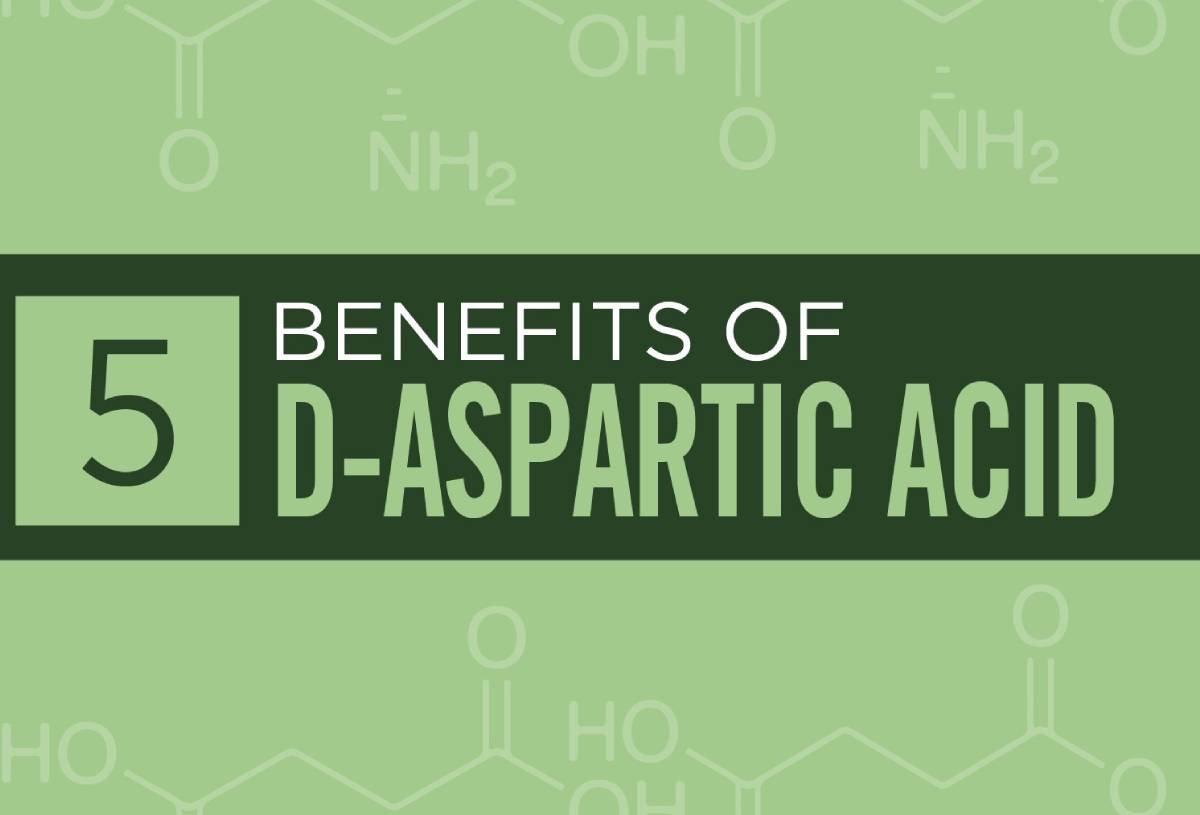What is D-Aspartic Acid (D-AA)?
D-Aspartic Acid is an amino acid and amino acids are building blocks of proteins. It is natural for an amino acid to occur in two forms: L-amino acid and D-amino acid. D-AA is a nonessential amino acid and its other form, L-Aspartic Acid is a mirror image. They are thus different in their properties though they have the same chemical formula.
L-Aspartic Acid must work in combination with other amino acids, but D-Aspartic Acid can exist independently to produce and release hormones like luteinizing hormone and follicle-stimulating hormone. As D-AA urges the central brain region to release hormones, it also results in the production of testosterone, which is why it is known as a testosterone booster.
Most studies try to understand D-AA in its natural conditions in the human body. With minimal information on D-Aspartic Acid as a supplement, it requires further research on the subject.
Natural Sources of D-AA

Though athletes and muscle-building individuals are known to take supplements of D-AA, it doesn’t mean that it is available exclusively as a supplement. Many natural foods contain a healthy amount of Aspartic acid. Below are some sources of D-AA:
- Eggs
- Meat
- Protein-fortified Cereal
- Avocado
- Bananas & Peaches
- Oysters
- Asparagus
- Nectarines
Dosage of D-AA Supplements
Too much of anything is a poison, which is why there is a recommended healthy dosage for everything we consume, right from meals and snacks to medicines and supplements. The standard usage of D-AA supplements is 2000 – 3000 mg. Some studies have indicated that the D-AA supplements have been very effective in physically inactive human beings, whereas it has been ineffective in those who lead a physically active lifestyle.
It is a wise thing to consult healthcare professionals and take advise on the dosage. Since medications and supplements are subjective to each person, it can be risky to decide your own dosing. It also depends on your health history, genetic history, and usage of other medicines.
Health Benefits & Uses of D-AA

Studies on the effect of D-AA on human health are insufficient to strongly support the claims of its uses. All such uses are assumptions based on the minimal studies on this amino acid. Though further research is necessary to gain a strong ground, below are some health benefits and uses of D-AA, which gained popularity in the fitness industry.
- May boost testosterone levels
Various sources suggest that the dietary supplement, D-Aspartic Acid has testosterone-boosting ability. However, further studies have proved that it is highly effective only in individuals who are healthy and physically inactive, but not in those who are active. Since high testosterone levels can result in more benefits in a human body, it is credited to the use of D-AA.
- Better sleep and better circulation
High testosterone levels are supposed to induce a good night’s sleep, increasing the quality of your sleep-wake cycle. You will also recover fast from your workout session. Testosterone is also known to increase the concentration of red blood cells in the body, delivering more oxygen to your muscles. This, in turn, develops your exercise endurance.
- Increased energy levels
Besides all the benefits of high testosterone levels, there is one more major benefit to it. Raising levels of testosterone leads to high production of energy. It promises great sporting performance, which is why D-AA has gained immense popularity in the fitness industry.
- Quality indicator of female fertility
A study involving women going through IVF treatment suggests that the presence of D-Aspartic Acid is an indicator of their fertility. The higher the D-AA is in their bodies, the higher is their quality of oocytes (immature egg cells). D-AA occurs naturally in the follicular fluid, which helps in the protection and nourishment of the female egg, but its levels vary from individual to individual.
- May increase sperm quality
Sperm is a direct indicator of a man’s fertility and his ability to reproduce. This, in turn, relies on the quality and quantity of the sperm. Research has shown a possibility of significantly increasing male fertility through D-Aspartic Acid dietary supplements. They increase the levels of testosterone and other sex hormones, controlling the development of a fully functional sperm that is required for reporduction. Taking a prescribed dosage of D-AA supplement is also known to boost the sperm count and improve its swimming ability during sexual intercourse. Despite its many other benefits, D-AA is thus commonly known for its effect on male fertility.
- Predicts aging
L-Aspartic Acid that is naturally found in the human body gradually converts into D-Aspartic Acid as the human body ages. This leads to higher levels of D-AA in older individuals as its levels increase with age. This conversion within the human body helps medical professionals determine the age of a human body in multiple situations including post-mortem and research.
- Maybe a nootropic
Nootropics are also known as smart drugs and cognitive enhancers increase brain activity. Studies on D-Aspartic Acid shows traces of nootropic activity as teh free molecules of D-AA increases the levels of an enzyme that could alter its amino acid form. This results in a significant boost to memory and thought processes in a human brain.
Safety & Side Effects of D-AA Supplements
Taking D-Aspartic Acid supplements according to reccommended dosage doesn’t result in harmful effects in the long run, however you should not take it for more than 90 days. It is the standard dosage of D-AA with credible research and the effects of taking this supplement for longer than 90 days are unknown yet. Further research is necessary to know more about the safety of D-AA when consumed for more than 90 days.
However, some side effects like nervousness, irritability, and headaches are recored in certain individuals. Studies have proven that such effects are subjective. It is also important to note that D-AA dietary supplements are recommended for women and children, even in the fitness industry due to insufficient research. It is in fact precautionary for pregnant and breastfeeidng women D-Aspartic Acid might cause brain defects in newborns
Alternatives of D-AA for Increased Performance
Since D-AA seems to be a popular topic in the fitness and athletics industries, it must be acknowledged that there is only a limited information about it. Naturally, it is safe to take in D-Aspartic Acid that is already present in the food you eat, but due to insufficient research, it is wise to consider your alternatives of D-Aspartic Acid if you want to increase your performance in sports or gym. You should try safe and effective solutions that are backed by credible and complete research.
Since D-AA has effects on fertility functions and overall natural hormonal balance in your body, you should consider alternatives that don’t mess with anything else about your health or body and just helps you increase your energy and show better performance. You should still remember that too much of anything is toxic.
Supplements Which Have Greater Amounts of D Aspartic Acid:
- Test Boost Max (Review 2023) – Uses, Benefits, Working, Cons And Best Alternatives
- Anavar (Oxandrolone) Review – Working, Side Effects and Best Alternatives
- Testo-Max Review: What is Testo max, Ingredients, Pros & Cons, side effects, science behind
- Testoprime Reviews: Ingredients, Pros, Cons and Science Behind Its Working! (August Update)
- Nugenix Total T review – Is This Testosterone Booster Effective?
- Primegenix Testodren Review: Testodren, Ingredients, Benefits, Side effects, Pros, Cons and FAQ’s







